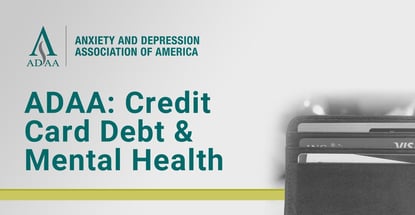In a Nutshell: Concerns about financial matters can lead to elevated stress levels, particularly in times of great economic hardship. We spoke with psychiatrist Michael S. Ziffra of Northwestern University in Chicago and the Anxiety and Depression Association of America (ADAA) to understand more about the connection between stress and finance, and how it can lead to more serious conditions. Ziffra explained that in times of uncertainty, such as the current COVID-19 pandemic, people can feel higher levels of stress about finances and simply not knowing what the future holds. Ziffra also discussed how to identify when it may be time to seek professional help.
After my son was born, my wife decided to take a break from her career to stay with him at home. Thankfully, we had enough of a financial cushion to allow her to spend this important time with our child.
After about a year, our safety net was rapidly dwindling and we found ourselves putting more and more charges on our credit cards. My wife eventually returned to the workforce, and thankfully, we were able to bring down our credit card debt without any serious damage to our credit scores or other negative repercussions.
 But when our credit card balances were on the rise, so was my stress level. Concerns about how long our financial cushion would last and how high our credit card balances were getting easily took over my thoughts and distracted me from what was a great time in our lives.
But when our credit card balances were on the rise, so was my stress level. Concerns about how long our financial cushion would last and how high our credit card balances were getting easily took over my thoughts and distracted me from what was a great time in our lives.
Like me, millions of U.S. consumers are familiar with the stress that can be brought on by their financial situations. And elevated stress levels can eventually lead to more long-term problems, including anxiety and depression.
We recently spoke with psychiatrist Michael S. Ziffra of Northwestern University in Chicago about the burden of stress brought on by finances and how the COVID-19 pandemic has only added to the financial pressure many people experience. We got in touch with Ziffra through the Anxiety and Depression Association of America (ADAA), of which he is a member.
The ADAA comprises 1,800 professional mental health professionals who help those struggling with anxiety, depression, and co-occurring disorders through a range of methods, including education, training, and research.
The COVID-19 Pandemic Has Led to Higher Stress Levels Around Finances
Ziffra said he sees patients on a daily basis, and they can range from people who are dealing with relatively minor mental health issues to those who are severely ill. He said that the topic of financial stress comes up fairly often among his patients.
“Obviously, any sort of stress, in general, is something that drives problems such as depression or anxiety,” Ziffra explained. “For obvious reasons, financial stress nowadays has been one of the big things.”

Michael Ziffra is a psychiatrist with the Northwestern University in Chicago and a member of the ADAA.
The past few months, with the COVID-19 pandemic in full swing, reminds him of what he saw around 2008 following The Great Recession, he said.
“This definitely seems to be a time of huge financial stress, and I think there’s a whole variety of factors that go into the mix,” Ziffra said.
Some of those factors include unemployment, the fear of losing jobs, and the need to change spending habits due to the pandemic. People may find themselves — as I did — slowly building up credit card debt until the balance began to look a bit scary.
“Aside from the actual financial concerns, I think there’s just a general sense of the world feeling very uncertain,” Ziffra said. “There’s a worry that things are not going to get back to normal soon, or maybe ever.”
He said any sort of feelings of uncertainty or ambiguity about the world or difficulty feeling hopeful about things will most likely compound any stress people are already experiencing about their financial situation.
Ziffra’s statements are supported by numerous sources that show Americans are feeling higher levels of financial stress because of the pandemic. A recent survey by Edelman Financial Engines showed that 47% of American workers reported that they have a lot of financial stress.
Helping People Understand That They Can Take Power Over Their Situation
Ziffra’s role as a psychiatrist has several functions, he said, and he broke these functions down for us.
“One is to simply provide support and an empathic response,” Ziffra said. “A lot of these individuals, they may feel very alone. They may not have much support in their lives. Maybe they’re single. Maybe they don’t have a supportive family.”
For these patients, simply providing a safe space where they can talk about the issues is very helpful, he said.
“I find that patients who come in with these concerns about finances, there’s often a lot of very strong emotions that come across in feelings of shame, guilt, or self-blame,” Ziffra said. “My job is to listen empathically and make sure that patients are not really beating themselves up over what happens.”
He said it’s important to help them understand that they are experiencing common problems that many other people face as well, and they are often related to circumstances outside of their control.
Then, Ziffra said he helps patients figure out what the next steps are. Often when people are feeling very depressed or anxious, they feel a sense of powerlessness, Ziffra said. They feel so overwhelmed that they don’t know what to do next.
“So part of my job is to help them understand they do have some power to change the situation, that they do have the ability to take action; to give them some sense of self-esteem, some sense of self-efficacy, about the situation,” Ziffra said.
He said that some patients may say that they’re so stressed about finances that they don’t even open their bills or pay their bills because it’s too overwhelming.
“One thing I might do with them is to help them figure out a strategy for tackling that mountain of mail that has piled up, and figuring out what to do with all these bills they have to take care of,” Ziffra said.
Sometimes the next step may involve helping them figure out who to go to next, whether it’s their bank or a financial advisor, to help them start getting their finances under control.
In the end, it’s really about helping people understand that there are some things they can control. And once they identify those things, they can take power and control of the situation, and Ziffra helps them gain the tools to do this.
Knowing When It’s Time to Seek Professional Help
“Stress in and of itself does not indicate the presence of an actual mental illness or mental disorder,” Ziffra said. “But stress can predispose to those things. And stress can impede the resolutions of those issues.”
Most people are experiencing stress to some degree, it’s completely normal, he said. Not everyone in that situation needs to seek professional help. But it is important to understand if and when one should consider it.

Ziffra discussed signs that may indicate a person should seek professional help, including having dark thoughts and trouble sleeping.
He said the key is to look at to what degree stress is impacting your day-to-day functioning.
“For instance, if you’re so stressed and worried that you can’t focus and concentrate, you can’t do your job or can’t maintain basic things at home, that would be an example of a situation where you might want to seek help,” he said.
Ziffra said depression or anxiety disorders can also cause a variety of physical manifestations.
“If you’re noticing things like you’re not sleeping as well, there are changes to your appetite, you’re feeling more fatigued — those would be situations to seek out help,” he said. “And needless to say, if it’s a situation where it feels really dire, if you’re feeling hopeless, where you’re thinking that life may not be worth living, you should definitely seek help right away.”
For those who feel like they are dealing with more than stress, and may need professional help, the ADAA, the National Institute of Mental Health, and the Mayo Clinic provide depression and anxiety resources on their websites.
And, of course, the National Suicide Prevention Lifeline (1-800-273-8255) is free and confidential and provides support 24/7 for anyone in distress.
Advertiser Disclosure
CardRates.com is a free online resource that offers valuable content and comparison services to users. To keep this resource 100% free, we receive compensation for referrals for many of the offers listed on the site. Along with key review factors, this compensation may impact how and where products appear across CardRates.com (including, for example, the order in which they appear). CardRates.com does not include the entire universe of available offers. Editorial opinions expressed on the site are strictly our own and are not provided, endorsed, or approved by advertisers.






![9 Best Ways to Pay Off Credit Card Debt (From Expert Beverly Harzog) ([updated_month_year]) 9 Best Ways to Pay Off Credit Card Debt (From Expert Beverly Harzog) ([updated_month_year])](https://www.cardrates.com/images/uploads/2017/10/Beverly-9Best.jpg?width=158&height=120&fit=crop)
![[current_year] Credit Card Debt Statistics (Average U.S. Debt) [current_year] Credit Card Debt Statistics (Average U.S. Debt)](https://www.cardrates.com/images/uploads/2018/04/shutterstock_243114739-edit.jpg?width=158&height=120&fit=crop)
![9 Expert Solutions: Build Credit Without a Credit Card ([updated_month_year]) 9 Expert Solutions: Build Credit Without a Credit Card ([updated_month_year])](https://www.cardrates.com/images/uploads/2018/05/without2.png?width=158&height=120&fit=crop)
![How to Sign Up For a Credit Card: Expert Guide ([updated_month_year]) How to Sign Up For a Credit Card: Expert Guide ([updated_month_year])](https://www.cardrates.com/images/uploads/2017/12/signup2.png?width=158&height=120&fit=crop)